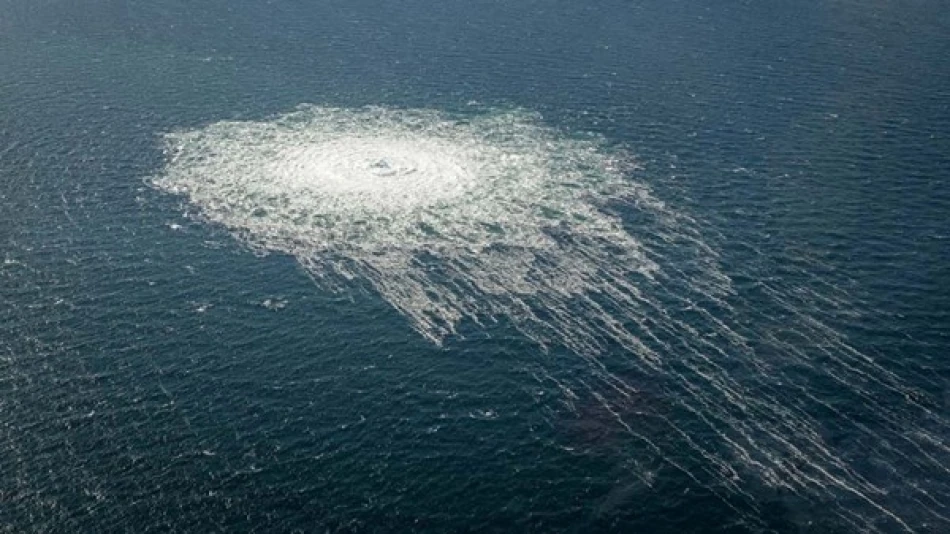
Italy Apprehends Suspect in Alleged Sabotage of Nord Stream Pipeline
Major Break in Nord Stream Investigation: Italian Authorities Arrest Ukrainian Suspect
Three years after the sabotage of Russia's Nord Stream gas pipelines sent shockwaves through European energy markets, Italian authorities have arrested a Ukrainian national suspected of coordinating the underwater explosions. This marks the first arrest in a case that has become emblematic of the shadow warfare accompanying the Ukraine conflict, potentially reshaping how Europe views energy security and covert operations within its borders.
The Arrest That Could Unravel a Maritime Mystery
German federal prosecutors specializing in terrorism cases issued a European arrest warrant for Sergiy K., who was detained by Italian police in Rimini province on Thursday. Authorities suspect he played a key coordinating role in placing explosives on both Nord Stream 1 and Nord Stream 2 pipelines near Denmark's Bornholm island in September 2022.
German Justice Minister Stephanie Hörbig praised what she called the "remarkable success" of federal prosecutors, marking a rare public celebration of progress in a case that has frustrated investigators across multiple European nations.
A Sophisticated Maritime Operation
The September 26, 2022 attack involved four massive gas leaks preceded by underwater explosions that occurred hours apart, effectively severing Russia's primary gas arteries to Europe. The timing proved strategically devastating—Moscow had already suspended gas deliveries through Nord Stream 1, and the sabotage ensured no quick resumption of flows that once supplied 40% of Europe's Russian gas imports.
The Sailing Boat Conspiracy
German prosecutors revealed that Sergiy K. and accomplices used a sailing vessel that departed from Rostock, a German Baltic Sea port. The boat was rented from a German company using forged identity documents obtained through intermediaries—a level of operational sophistication suggesting state-level planning rather than freelance terrorism.
This maritime approach mirrors tactics used in other recent European sabotage incidents, including damaged undersea cables in the Baltic. The method demonstrates how civilian vessels can become instruments of hybrid warfare, exploiting Europe's open maritime borders.
The Ukrainian Connection Deepens
The arrest validates reporting by German media outlets ARD, Die Zeit, and Süddeutsche Zeitung, which identified a Ukrainian diving trail in the investigation. A professional diver known as Volodymyr Z. remains at large after fleeing Poland for Ukraine before German authorities could apprehend him.
More controversially, the Wall Street Journal reported that former Ukrainian military chief Valeriy Zaluzhny oversaw the pipeline bombing plan. Kyiv's presidency dismissed these claims as "absolute nonsense" in August 2024, but the arrest adds credibility to Ukrainian involvement theories.
Geopolitical Implications for Energy Security
This development carries profound implications for European energy policy and alliance dynamics. If Ukrainian operatives conducted the sabotage, it would represent an unprecedented attack by a Western-backed nation on critical European infrastructure—even if that infrastructure served Russian interests.
The Investigation Landscape
Germany, Sweden, and Denmark launched separate judicial investigations following the explosions. However, both Scandinavian countries closed their probes in 2024, leaving Germany as the primary investigative authority. This consolidation suggests German prosecutors may possess the most compelling evidence trail.
The closure of Swedish and Danish investigations also reflects the political sensitivity surrounding the case. Both nations likely prefer avoiding diplomatic complications with either Ukraine or Russia while the war continues.
Market and Strategic Consequences
The Nord Stream sabotage accelerated Europe's energy transition away from Russian supplies, forcing the continent to embrace more expensive LNG imports and renewable alternatives. European gas prices spiked initially but have since stabilized as alternative supply chains matured.
For energy markets, the arrest signals that underwater infrastructure remains vulnerable to asymmetric attacks. This reality has prompted increased security measures around critical pipelines and cables, raising operational costs across the sector.
What Comes Next
Sergiy K. will face German federal justice authorities after his extradition from Italy. His testimony could reveal whether the operation had official Ukrainian backing or represented a rogue military initiative. The answers may determine whether this case becomes a footnote in wartime chaos or a diplomatic crisis between allies.
The arrest also raises questions about other suspected accomplices still at large. German authorities clearly possess detailed operational intelligence about the plot, suggesting additional arrests may follow as the investigation progresses through European courts.
Most Viewed News

 Layla Al Mansoori
Layla Al Mansoori






